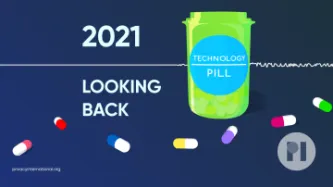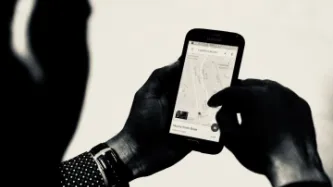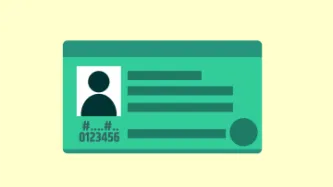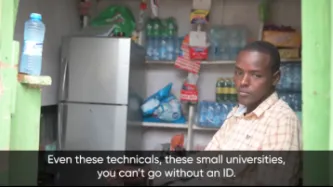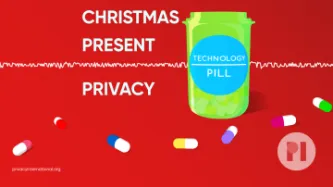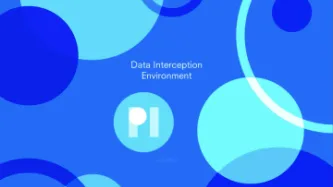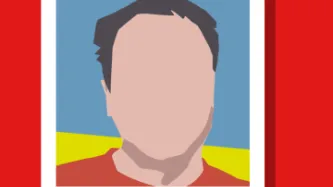Advanced Search
Content Type: Long Read
This piece is a part of a collection of research that demonstrates how data-intensive systems that are built to deliver reproductive and maternal healthcare are not adequately prioritising equality and privacy.
Digital health apps of all kinds are being used by people to better understand their bodies, their fertility, and to access health information. But there are concerns that the information people both knowingly and unknowing provide to the app, which can be very personal health…
Content Type: Video
Links
More information about how Bounty illegally exploited the data of 14 million mothers and babies: https://pvcy.org/podillegalexploitation
Sign up to our corporate exploitation email list to find out more about our work on brands and the advertising supply chain: https://pvcy.org/podsignup
Original podcast: https://privacyinternational.org/video/3787/podcast-marketing-and-maternity
----------
Orginally Recorded 12th March 2020.
We can’t believe we’re having to say…
Content Type: Explainer
Introduction/Background
Electronic tags have been a key part of criminal justice offender management for over 20 years, being used in the United States since the mid 1980’s and in the UK and some other commonwealth countries since 2003. In 2021 the UK introduced GPS tagging for immigration bail.
The tag is predominantly used to curtail the liberties of individuals. For those on criminal bail its intended use includes managing return into communities while deterring reoffending.
As we explore…
Content Type: Video
Links
Teens and Facebook
Frances Haugen and Instagram
Facebook and Metaverse
Metaverse and Bandwidth
EFF on new Google replacement for cookies
Google's follow up plan to replace cookies
EV cars and the national grid
The gates of hell
South Africa, Omicron, and travel
Patent-free covid vaccine
Covid vaccine plastic bag shortage
James Webb telescope
Human trails for Elon Musks' brain chip
Content Type: Video
Links
Our predictions from 2021
Clearview UK provisional fine
Clearview legal trouble in France
Clearview investments
TRIPS waiver
Travel podcast
Patent-free vaccine
Mental health podcast
Dr David works for the Mental Health Foundation
Google unionise
The 'Great Resignation'
PI has been working with two unions on our managed by bots campaign
Complicated history of plagues and workers
Indian National Education Plan
Ugandan Election
Crypto mining trouble
US commitment…
Content Type: Long Read
In a roundtable available on YouTube, co-hosted with Garden Court Chambers, Privacy International brought together immigration law practitioners to discuss how they’ve used privacy and data protection law to seek information or redress for their clients.Index:1. UK Border 20252. Super-complaint and judicial review challenge to data sharing3. Mobile phone seizure and extraction4. Freedom of Information Act requestsThe dystopian future: UK Border 2025To set the scene on how the future may look…
Content Type: Advocacy
We wrote to the Home Office as part of our campaign ‘STOP SPYING ON ASYLUM SEEKERS’, opposing the draconian surveillance of asylum seekers taking place through the Aspen Card.
We asked detailed questions about how data collected from Aspen Card usage is used to monitor asylum seekers, and how the Home Office are alerted to any ‘breach of conditions’ of the card.
In their reply, the Home Office told us that:
“The Home Office can be alerted to a breach of conditions by several internal and…
Content Type: News & Analysis
Last week, Privacy International intervened in an important and long overdue Judicial Review into the UK Home Office’s secret and blanket policy of seizing mobile phones of all migrants who arrived to the UK by small boat between April 2020 and November 2020.
The case revealed that migrants were searched on arrival at Tug Haven in Dover and compelled to hand over their mobile phones and provide their PIN numbers. During the course of proceedings it came to light that the Home Office had self-…
Content Type: News & Analysis
In a ruling handed down on 14 October 2021 by the High Court of Kenya in relation to an application filed by Katiba Institute calling for a halt to the rollout of the Huduma card in the absence of a data impact assessment, the Kenyan High Court found that the Data Protection Act applied retrospectively.
Background to the case
Huduma Namba as initially proposed
In January 2019, the Kenyan Statute Law (Miscellaneous Amendment) Act No. 18 of 2018 came into effect, introducing a raft of amendments…
Content Type: Advocacy
The role that personal data plays in political campaigns https://privacyinternational.org/learn/data-and-elections and the risks of data abuse and exploitation only entered into the public discourse a few years ago, when Cambridge Analytica became a household name thanks to several scandals over the course of 2017 and 2018.
Since then, we have seen a flurry of initiatives that have helped shed light on the otherwise very opaque practices of digital campaigning. There have been public…
Content Type: Guide step
The information you (consciously or not) share with Telegram can be very revealing. It can also be (mis)interpreted by government agencies and used to profile individuals. Once installed on a device, depending on your settings, the Telegram app may have access to information such as your location, contact information and media stored on the same device. All of this data can be potentially be accessed remotely using cloud extraction technology.
Your Telegram app generates a lot of data that can…
Content Type: Guide step
The information you (consciously or not) share with Facebook can be very revealing. It can also be (mis)interpreted by government agencies and used to profile individuals. Once installed on a device, depending on your settings, the Facebook app may have access to information such as your location, contact information and media stored on the same device. All of this data can be potentially be accessed remotely using cloud extraction technology.
Your Facebook app generates a lot of data that can…
Content Type: Guide step
The information you share on WhatsApp can be very revealing. Once installed on a device, the app potentially has access to information such as your location, contact information, and media stored on the same device.
Your WhatsApp app generates a lot of data that can also be stored on your device and elsewhere. It’s important for you to be able to understand the types of data that apps like WhatsApp generate. Government agencies may seek access to this data through at least two routes: they…
Content Type: Guide step
The information you (consciously or not) share with X can be very revealing. It can also be (mis)interpreted by government agencies and used to profile individuals. Once installed on a device, depending on your settings, the X app may have access to information such as your location, contact information and media stored on the same device. All of this data can be potentially be accessed remotely using cloud extraction technology.
This guide shows you how to obtain the data X stores about you…
Content Type: Advocacy
Privacy International (PI) welcomes the aim of the Digital Markets Act (DMA) to address some of the challenges posed by the way the current digital markets operate. As we noted in our preliminary assessment, the proposal put forward by the European Commission in December 2020 contains some shortcomings that need to be addressed, if the DMA were to be effective in tackling these challenges. Some of these shortcomings have been addressed, particularly by the European Parliament in its resolution…
Content Type: Guide step
Your Uber app generates a lot of data that is stored in the app and shared with Uber.
It’s important for you to be able to understand the types of data that apps like Uber’s generate. Government agencies may seek access to this data through at least two routes: they could directly access your device and then analyse the data stored in the app and data your app shares and can access on Uber’s servers (and potentially data backed-up to your cloud provider) using ‘cloud extraction’ techniques, or…
Content Type: News & Analysis
2022 will see a raft of high tech surveillance tools emerging in the UK government’s arsenal, which will further entrench a ‘hostile environment’ for migrants. Compounding this further, immigration officers will increasingly be using digital forensic tools such as 'mobile phone extraction' under a veil of secrecy. This raises serious concerns about overreach, misuse and abuse of power, the actual quality and integrity of the data they gather, and independent oversight of these powers. But it…
Content Type: Case Study
Overview
Estonia is widely considered one of the most digitally advanced countries in the world. Its e-ID is the gateway through which e-citizens are able to access most public services. Estonia's e-ID is both designed and operated by a collection of private companies, and overseen by the Police and Border Guard agency.
X-Road® (implemented in Estonia as X-tee) is the free and open-source data exchange layer which provides a standardised method for transferring information between the data…
Content Type: Long Read
This piece is a part of a collection of research that demonstrates how data-intensive systems that are built to deliver reproductive and maternal healthcare are not adequately prioritising equality and privacy.
What are they?
Short Message Services (SMS) are being used in mobile health (MHealth) initiatives which aim to deliver crucial information to expecting and new mothers. These initiatives are being implemented in developing countries experiencing a large percentage of maternal and…
Content Type: Video
In Kenya, if you don’t have an ID, life can be extremely difficult. But for thousands of people across the country, getting an ID can be nigh on impossible. Some Kenyan citizens can’t obtain a national ID because they are registered in the Kenyan refugee database. Often referred to as victims of double registration, their predicaments reveal a deeper problem with ID itself.Now Haki na Sheria - a Kenyan organisation advocating for and supporting the victims of double registration - and three…
Content Type: Key Resources
Content Type: Video
Links
Donate to PI and get your facemask
Mozilla's *privacy not included project
US PIRG's Trouble in Toyland
Roomba home maps and concerns from 2017 about Roomba sharing that information
ICO advice
Our guides for protecting yourself from online tracking
Our Amazon Ring report "One Ring to Watch Them All"
Find out more about our legal work
Extra audio credit details in order of appearance:
acclivity (sleigh bells)
dj997 (additional bells)
Marta Tsvettsikh (fire sound)
waxsocks…
Content Type: Video
Watch Part 1 of our videos on How to use the Data Interception Environment (DIE). It goes through downloading the DIE from PI's GitHub, setting up a virtual phone, and changing network settings to allow data to be intercepted.
Watch Part 2 of our videos on How to use the DIE. It goes through fixing the certificates for the virtual phone, and how to start using the DIE to view and analyse data being sent from the phone.
PI has made this tool available to assist individuals, researchers and…
Content Type: News & Analysis
The notorious Clearview AI first rose to prominence in January 2020, following a New York Times report. Put simply, Clearview AI is a facial recognition company that uses an “automated image scraper”, a tool that searches the web and collects any images that it detects as containing human faces. All these faces are then run through its proprietary facial recognition software, to build a gigantic biometrics database.
What this means is that without your knowledge, your face could be stored…
Content Type: Video
Links
You can read more about the DIE, including some of the research we've done that's used it here: https://privacyinternational.org/learn/data-interception-environment
You can find our work about apps sharing data with Facebook here: https://privacyinternational.org/appdata
You can download the DIE to have a go with it yourself here: https://github.com/privacyint/appdata-environment-desktop/tree/update-3




